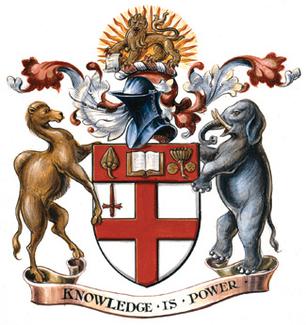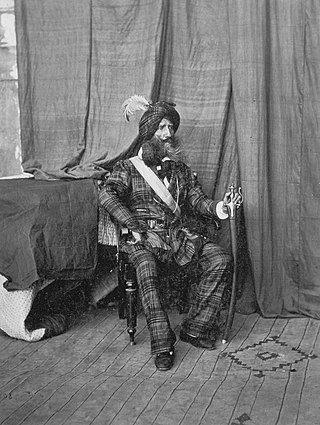Related Research Articles

Sir William Jones was a British philologist, orientalist and a puisne judge on the Supreme Court of Judicature at Fort William in Bengal, and a scholar of ancient India. He is particularly known for his proposition of the existence of a relationship among European and Indo-Aryan languages, which later came to be known as the Indo-European languages.

The Scottish Enlightenment was the period in 18th- and early-19th-century Scotland characterised by an outpouring of intellectual and scientific accomplishments. By the eighteenth century, Scotland had a network of parish schools in the Scottish Lowlands and five universities. The Enlightenment culture was based on close readings of new books, and intense discussions which took place daily at such intellectual gathering places in Edinburgh as The Select Society and, later, The Poker Club, as well as within Scotland's ancient universities.

The School of Oriental and African Studies is a public research university in London, England, and a member institution of the federal University of London. Founded in 1916, SOAS is located in the Bloomsbury area of central London.

Sir Charles Wilkins was an English typographer and Orientalist, and founding member of The Asiatic Society. He is notable as the first translator of Bhagavad Gita into English. He is also the first person to introduce the term Hinduism which would refer to all the different mythologies and cultures of which were existing in India as one. He supervised Panchanan Karmakar to create one of the first Bengali typefaces. In 1788, Wilkins was elected a member of the Royal Society.

Anthony Malcolm Daniels, also known by the pen name Theodore Dalrymple, is a conservative English cultural critic, prison physician and psychiatrist. He worked in a number of Sub-Saharan African countries as well as in the East End of London. Before his retirement in 2005, he worked in City Hospital, Birmingham and Winson Green Prison in inner-city Birmingham, England.

Colonel Alexander Haughton Campbell Gardner, also known as Gordana Khan, was a traveller, soldier, and mercenary active in Afghanistan and Punjab. He served in various military positions in the region, most notably for the Sikh Empire of Ranjit Singh.

William Marsden was an Irish orientalist, numismatist, and linguist who served as Second, then First Secretary to the Admiralty during years of conflict with France.
Robert Graham Irwin is a British historian, novelist, and writer on Arabic literature.

Oriental studies is the academic field that studies Near Eastern and Far Eastern societies and cultures, languages, peoples, history and archaeology. In recent years, the subject has often been turned into the newer terms of Middle Eastern studies and Asian studies. Traditional Oriental studies in Europe is today generally focused on the discipline of Islamic studies; the study of China, especially traditional China, is often called Sinology. The study of East Asia in general, especially in the United States, is often called East Asian studies.

Sir Harold Walter Bailey,, who published as H. W. Bailey, was an English scholar of Khotanese, Sanskrit, and the comparative study of Iranian languages.
Alfred Felix Landon Beeston, FBA was an English Orientalist best known for his studies of Arabic language and literature, and of ancient Yemeni inscriptions, as well as the history of pre-Islamic Arabia. His works were generally published under the name A. F. L. Beeston.

Vladimir Fyodorovich Minorsky was a Russian academic, historian, and scholar of Oriental studies, best known for his contributions to the study of history of Iran and the Iranian peoples such as Persians, Laz people, Lurs, and Kurds.
David Neil MacKenzie FBA was a scholar of Iranian languages.

Anthony Hyman was a British academic, writer, broadcaster, and Islamicist.

Sir Edward Denison Ross was an orientalist and linguist, specializing in languages of the Middle East, Central and East Asia. He was the first director of the University of London's School of Oriental Studies from 1916 to 1937.

Charles Otto Blagden was an English Orientalist and linguist who specialised in the Malay, Mon and Pyu languages. He is particularly known for his studies of Burmese epigraphic inscriptions in the Mon and Pyu scripts.

William Kirkpatrick (1754–1812) was an East India Company officer, diplomat and orientalist active in Colonial India during the period of Company rule.
Hugh Russell Tinker was a British historian. He taught politics at Lancaster University for many years.
References
- ↑ "Announcement - Bruce Wannell has passed away | SOAS University of London". www.soas.ac.uk. Retrieved 2020-07-20.
- 1 2 "Bruce Wannell obituary". The Times of London. Feb 13, 2020. ISSN 0140-0460 . Retrieved 2020-07-20.
- 1 2 Thomson, Hugh (2020-08-13). "The pleasures — and trials — of knowing Bruce Wannell". The Spectator. Retrieved 2023-09-24.
- ↑ Dalrymple, William (2020-11-27). "Bruce Wannell: Ode to an Orientalist". Open The Magazine. Retrieved 2023-09-18.
- ↑ Rogerson, Barnaby; Baring, Rose (2020). Tales from the Life of Bruce Wannell: Adventurer, Linguist, Orientalist. Sickle Moon Books. ISBN 978-1-900209-26-7.